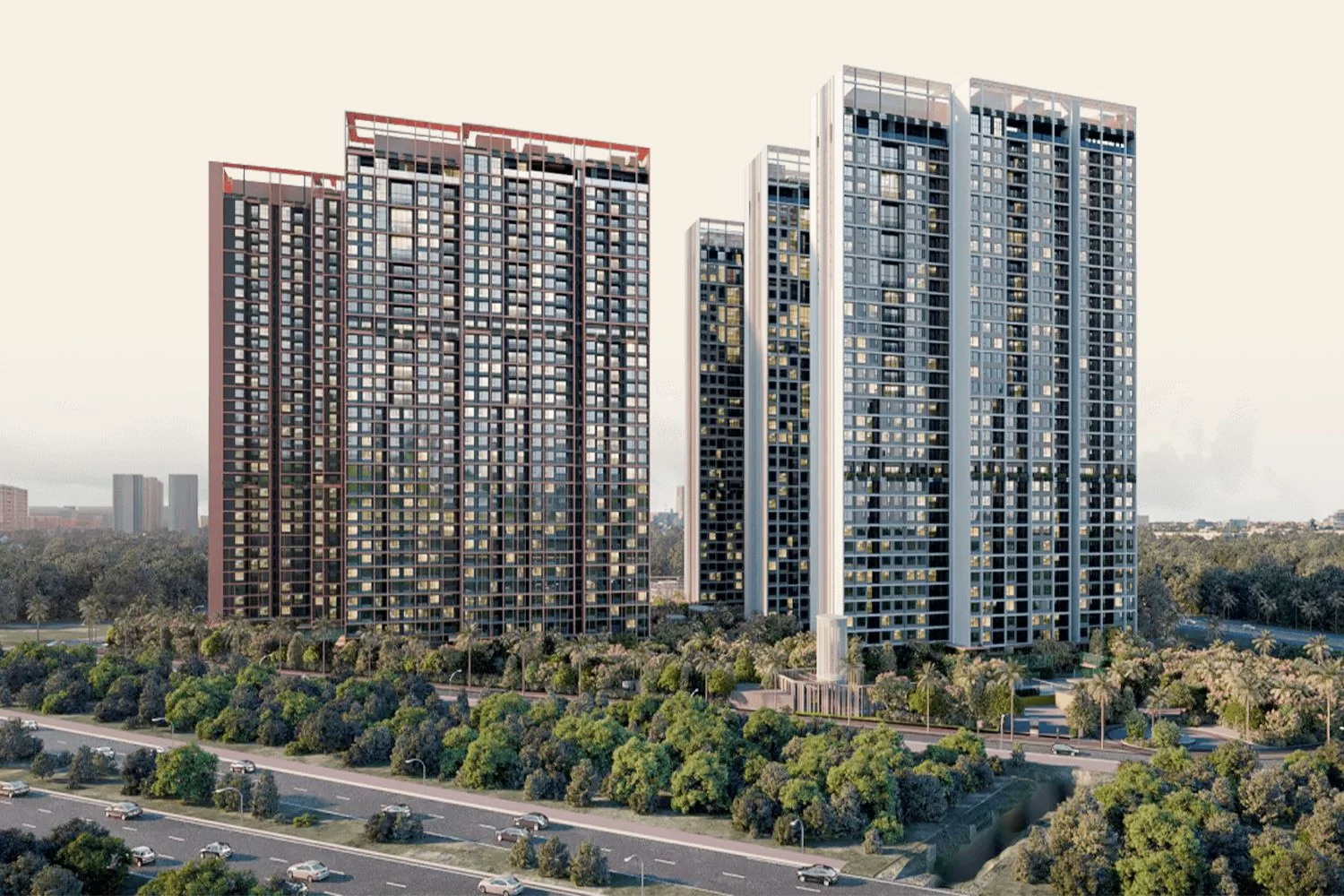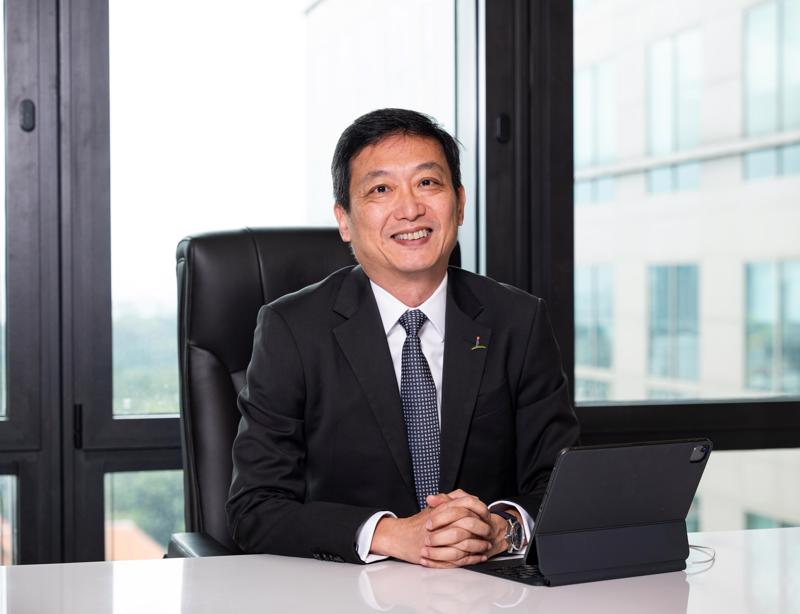2024 marks 30 years in Vietnam for CapitaLand. What has been significant in its business performance over the course of the last three decades?
As we celebrate CapitaLand’s 30th anniversary in Vietnam, we are proud to reflect on the remarkable journey we have undertaken since 1994. Our initial foray into the market began with serviced residences and commercial projects, laying a strong foundation for our future endeavors.
Over the past three decades, CapitaLand has demonstrated consistent and strategic growth in Vietnam. Our portfolio has expanded to include a diverse range of high-quality developments, comprising one retail mall, one SOHO [small office / home office] development, two integrated developments, over 18,000 quality homes across 18 residential developments, and nearly 9,000 lodging units across 35 properties.
We have embarked on large-scale projects in recent years, such as Sycamore in Binh Duong New City and Lumi Hanoi and The Senique Hanoi in Vietnam’s capital. Notably, Lumi Hanoi sets new standards in sophisticated and sustainable urban living, while Sycamore has become a new benchmark for holistic, sustainable living with first-rate amenities and green features that enhance the well-being of residents.
In addition, the successful handover of Heritage West Lake in Hanoi marked a significant milestone in our journey, showcasing our ability to deliver high-quality projects on time.
How has CapitaLand business strategy changed over the last three decades in Vietnam and what further changes will come in the future?
Vietnam one of three core markets for CapitaLand Development (CLD), the development arm of CapitaLand, alongside Singapore and China. This is due to Vietnam’s robust economic growth, a young and dynamic population, and rapid urbanization and industrialization. Over the years, Vietnam’s GDP has consistently grown at an impressive rate, averaging around 6-7 per cent annually since the early 2000s. This growth has been bolstered by a strong inflow of FDI, which reached approximately $10.84 billion in the first half of 2024 alone, marking a year-on-year increase of 8.2 per cent. Vietnam’s demographic advantage, with a young and dynamic population and a rapidly-expanding middle class projected to comprise 26 per cent of its population by 2026, has also fueled demand across various sectors, including real estate.
CLD’s strategy will continue to adapt to the changing landscape. We aim to grow our residential portfolio in Vietnam to 27,000 units by 2028. To reach this goal, we will increase our capital deployment in Vietnam and expand our development pipeline through strategic collaborations with reputable and like-minded local and foreign partners. Our focus will be on well-positioned, large-scale projects in key cities, capitalizing on CLD’s extensive expertise across the real estate value chain and our competitive advantages in master planning and sustainability.
In addition to the residential sector, we recognize the potential for CLD to explore opportunities in Vietnam’s growing commercial, industrial, and logistics sectors, in line with the country’s emergence as a global manufacturing hub.
What international practices has CapitaLand successfully applied to projects in Vietnam over the last three decades?
Vietnam remains one of CLD’s three core markets, driven by its significant economic and urban development potential.
Leveraging the CapitaLand Group’s strengths and extensive professional experience in international markets, we apply these insights to our local projects to meet the evolving needs of our customers. This approach is reflected in the quality and sustainability of our green-certified projects, managed by our in-house design and project management teams. These teams implement global best practices to ensure excellence in every aspect of our developments. For instance, Sycamore is set to become Binh Duong New City’s first electric vehicle (EV)-ready development, with all plots supported by EV charging stations. The façade of the residential units is designed with passive and active features that maximize the use of natural daylight and ventilation in each home. Lumi Hanoi, meanwhile, is positioned as one of CLD’s signature residential projects, delivering expertly-crafted living spaces and amenities that meet the aspirations of discerning homebuyers.
These projects exemplify our commitment to innovation and excellence, ensuring that we continue to meet and exceed the expectations of our customers in Vietnam.
In addition to Hanoi, Ho Chi Minh City, and Binh Duong, where else would you like to expand to and why?
As CLD aims to grow its residential portfolio in Vietnam to 27,000 units by 2028, we are excited about the opportunities that lie ahead. In addition to our established presence in Hanoi, Ho Chi Minh City, and Binh Duong, we see significant potential in expanding to Greater Hanoi and Greater Ho Chi Minh City. These areas include up-and-coming nearby cities and provinces such as Bac Giang, Bac Ninh, Hai Phong, Dong Nai, and Long An. Their strategic importance, burgeoning infrastructure, and favorable investment climate, characterized by rapid economic growth and increased FDI, make them increasingly attractive.
Vietnam’s residential market is poised for continued growth, driven by strong economic fundamentals, a young and dynamic population, and rapid urbanization. The government’s commitment to infrastructure development and favorable investment policies further enhance the market’s attractiveness. We are committed to delivering high-quality, sustainable living spaces that contribute to the country’s ongoing development.

Do you have any suggestions for Vietnam’s policymakers in attracting more investors to the property sector?
Vietnam presents both significant opportunities and notable challenges for our business. We have successfully navigated the competition, market fluctuations, and environmental and social issues by leveraging our global expertise, local knowledge, innovation, and sustainability practices. Our strong governance and financial performance enable us to scale rapidly, seize opportunities, and replenish our land bank, particularly in Vietnam.
To ensure smoother operations, especially for foreign investors like us, greater transparency and efficiency in project approvals are essential. To navigate these challenges, we collaborate with strong, like-minded partners who share our vision and commitment to excellence in our projects.
The Vietnamese Government has introduced the National Green Growth Strategy 2021-2030, with a Vision to 2050. What are CLD Vietnam’s plans to promote green growth and sustainable development to contribute to the country’s green vision?
As a leading real estate developer in Vietnam, CLD is committed to creating positive environmental and social impacts through our green and innovative initiatives. Our sustainability strategy is aligned with the CapitaLand Sustainability Master Plan 2030, a strategic blueprint that outlines our ambitious goals and actions to create positive environmental and social impacts across our real estate lifecycle.
To date, 78 per cent of our portfolio (by sq m) have green ratings and secured green building certification by a national authority or the World Green Building Council. We are working towards greening all of our developments in Vietnam by 2030, with each project meeting a minimum certification level. To foster innovation and enhance our operational efficiency and customer experience, we leverage the CapitaLand Innovation Fund - a S$50 million ($38.6 million) fund for sustainability and other high-tech innovations in the built environment space - to test-bed novel solutions at our Vietnam developments.
Corporate Social Responsibility (CSR) has become integrated more deeply into company culture in Vietnam in recent times. What CSR activities are CapitaLand implementing in the country and how would you evaluate their effectiveness?
We recognize that the long-term success of our business is closely intertwined with the health and prosperity of the communities we operate in. Since 2011, through our philanthropic arm, the CapitaLand Hope Foundation (CHF), we have refurbished four schools in Phu Tho, Hung Yen, and Long An provinces, creating safe and constructive learning environments for students. The fifth school refurbishment, in Bac Giang province, is set to be inaugurated by the end of the third quarter of this year.
Other initiatives, such as the “My Schoolbag” Program, the CapitaLand Kids Program @ Education Bursary, and the Nutrition Project under the CapitaLand Hope School Program, have significantly improved access to education and provided essential nutritional support for students.
Looking ahead, we aim to continue improving the social mobility of children in Vietnam, empowering them with better access to education and skills development to reach their aspirations. We look forward to collaborating with like-minded partners and local and international NGOs to uplift communities in need.
Vietnam boasts a young and sizable workforce with more young people joining every year. What is CapitaLand’s policy to attract and retain talent?
CLD prioritizes attracting and retaining talent by fostering a vibrant workplace centered around a Progressive - Learning - Fun culture. This approach empowers our employees to continuously enhance their skills through various learning and development opportunities, helping them thrive in a dynamic industry.
We also emphasize creating an engaging and enjoyable work environment that encourages collaboration and innovation. Our goal is to cultivate a progressive culture where forward-thinking ideas are supported, and employees feel valued and inspired to contribute meaningfully. Through this, CLD remains committed to providing a fulfilling and rewarding career experience for our teams in Vietnam.
After being in Vietnam for many years, what are your thoughts on the country’s living and working environment?
Vietnam is a nation characterized by dynamic energy, rich cultural heritage, and warm, welcoming people. Having lived and worked here for four years, I deeply appreciate its vibrant living and working environment.
From bustling urban centers like Ho Chi Minh City and Hanoi to serene rural landscapes, Vietnam offers diverse lifestyles and a rich variety of flavors. I personally enjoy all the local dishes.
On the professional front, Vietnam’s commitment to economic development has created a favorable business climate. The country benefits from a young, talented, and highly-motivated workforce. The business community is dynamic and collaborative, fostering a culture of continuous improvement and excellence.
“As we look to the future, we remain committed to driving innovation, sustainability, and excellence in all our endeavors in Vietnam.”
Mr. Ronald Tay, CEO of CapitaLand Development (Vietnam)









 Google translate
Google translate